Two representatives fr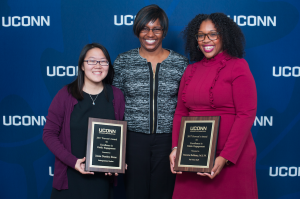 om the Neag School of Education at UConn, Patricia Bellamy and Jenna Stone, were awarded the 2017 Provost’s Award for Excellence in Public Engagement. The reception for the award winners was held on Nov. 14 to recognize these individuals for their exceptional dedication and significant contributions.
om the Neag School of Education at UConn, Patricia Bellamy and Jenna Stone, were awarded the 2017 Provost’s Award for Excellence in Public Engagement. The reception for the award winners was held on Nov. 14 to recognize these individuals for their exceptional dedication and significant contributions.
Patricia Bellamy, Assistant Director for Programs and Partnerships for Husky Sport, recently received the 2017 Provost’s Award for Excellence in Public Engagement in a full-time staff position.
Patti began volunteering for Husky Sport, a program established through the Department of Educational Leadership in the Neag School of Education, during her undergraduate career in 2009. She said that her initial passion for working with Husky Sport, and the relationships that she built in doing so, ultimately led her to switch her career focus and pursue a Master’s Degree in social work.
In working with students similar to and different from her, Patti learned that to truly connect with someone, one must be willing to understand where and who they are, without forgetting about his or her personal experience.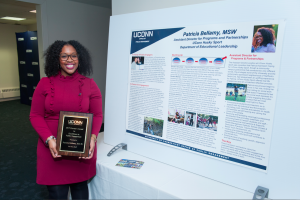
“Meeting people where they are is a social work term that I think more and more industries are grasping, but it’s understanding where people are, learning from them, not trying to be the expert of their career paths and their history, just letting people lead, listening and understanding from that and growing from that,” Patti said.
After receiving the award, Patti said that she was so proud that her experiences are being recognized, especially because she is normally shy when it comes to sharing her own accomplishments.
“I smiled like crazy but I couldn’t believe it, it seriously had not even been on my mind,” she said.
Justin Evanovich, Managing Director of Husky Sport, said that the people and partners of Husky Sport benefit greatly from Patricia’s sustained leadership, caring support and positive energy.
"She shines in this work through both her ability to foster meaningful relationships, and her facilitation of effective systems in collaborative partnerships," he said. "Patricia continues to positively empower others as part of her impactful leadership throughout all facets of Husky Sport."
When asked about where she would like to see herself working in the future, Patti said that a few years ago she might have said that she would like to have her own program but Husky Sport seems to have changed that path for her.
“Everything for me starts with an experience, a relationship and connections, building connections with people and I don’t want just anything, I want to really enjoy it,” she said. “The next thing is going to have to be ten times more awesome, twenty times more awesome, for me to even consider.”
Jenna Stone, a senior Elementary Education major in the Neag School of Education, was awarded the 2017 Provost’s Award for Excellence in Public Engagement as an undergraduate student.
Jenna currently serves as the coordinator for Jumpstart within Community Outreach, but has volunteered with the program since her freshman year at UConn. One of her primary focuses in this position is to decrease the achievement gap in early childhood education while acting as a liaison between team leaders and student leaders in Community Outreach.
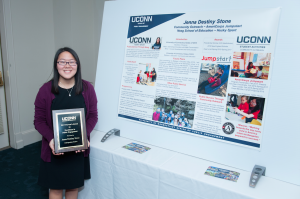 Jenna has learned while working with Jumpstart that she can act as a leader not only for preschool students, but for college students as well. After receiving the award this year, she said that she was more excited to share her experiences than to receive the recognition.
Jenna has learned while working with Jumpstart that she can act as a leader not only for preschool students, but for college students as well. After receiving the award this year, she said that she was more excited to share her experiences than to receive the recognition.
“Any time I get to share about the programs I’m involved with, I get excited,” Jenna said. “Service isn’t about the need to be recognized, but when you are it puts a big smile on your face.”
Not only is Jenna involved with Jumpstart, but she also serves as a volunteer for Husky Sport. Justin Evanovich said that Jenna possesses an extreme work ethic and a mature approach to managing her many endeavors.
"I’ve been fortunate to learn from Jenna about her work with Jumpstart, as well as her peer-and-programmatic leadership roles with Husky Sport, the Office of Community Outreach and the IB/M Neag Teacher Prep Program, to name only a few," he said. "In her everyday life, Jenna impacts many as an active citizen. We at Husky Sport are excited to support her next steps at UConn and beyond.”
Upon graduation, Jenna said that she hopes to be working in either a first or third grade classroom or as a fifth or sixth grade math teacher. She said that ultimately, she hopes to find a school that is diverse and that encourages students to raise the bar every day.
Jenna mentioned that during her freshman year, she would have never expected to hold the Jumpstart coordinator position, or even serve as a volunteer coordinator as she did last year.
“I think when you’re passionate about a topic, and a program, you truly do give your everything and you love every minute of it,” she said. “That’s how Jumpstart makes me feel.”
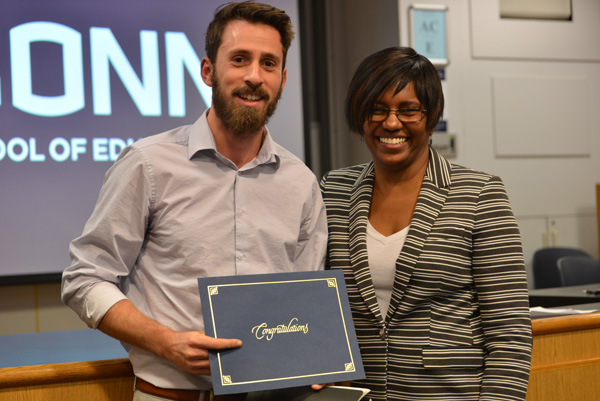 Congratulations to Charles D. T. Macaulay, who received the 2017 Outstanding Student Researcher Award from the Neag School of Education’s Associate Dean for Research and Faculty Affairs, Del Siegle last week.
Congratulations to Charles D. T. Macaulay, who received the 2017 Outstanding Student Researcher Award from the Neag School of Education’s Associate Dean for Research and Faculty Affairs, Del Siegle last week.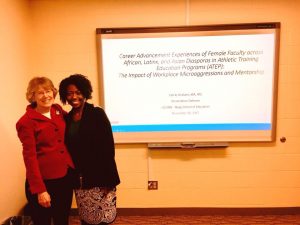 Congratulations to the newest Adult Learning doctoral candidate, Dr. Carrie Graham on the successful defense of her dissertation, “Career Advancement of Female Faculty Across African, Latinx, and Asian Diasporas in Athletic Training Education Programs: The Impact of Workplace Microaggressions and Mentoring.
Congratulations to the newest Adult Learning doctoral candidate, Dr. Carrie Graham on the successful defense of her dissertation, “Career Advancement of Female Faculty Across African, Latinx, and Asian Diasporas in Athletic Training Education Programs: The Impact of Workplace Microaggressions and Mentoring.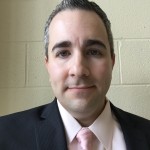 Anthony Mangiafico, member of the ’15 Ed.D. cohort, successfully defended his capstone proposal on September 27th. Anthony’s capstone seeks to center the narratives and experiences of Students of Color while currently pursuing their GED.
Anthony Mangiafico, member of the ’15 Ed.D. cohort, successfully defended his capstone proposal on September 27th. Anthony’s capstone seeks to center the narratives and experiences of Students of Color while currently pursuing their GED. Scott Hurwitz defended his proposal in October 2017. His capstone research proposal examines the how and to what extent school leaders frame policy with a specific focus on Connecticut's anti-bullying policy. He will also study the factors that shape how leaders frame their policy messages.
Scott Hurwitz defended his proposal in October 2017. His capstone research proposal examines the how and to what extent school leaders frame policy with a specific focus on Connecticut's anti-bullying policy. He will also study the factors that shape how leaders frame their policy messages. Dana Ziter, member of the ’15 Ed.D. cohort, successfully defended her capstone proposal on November 7th. Dana’s capstone assesses the impact of a new student advising protocol on UConn students currently on academic probation via a regression discontinuity design.
Dana Ziter, member of the ’15 Ed.D. cohort, successfully defended her capstone proposal on November 7th. Dana’s capstone assesses the impact of a new student advising protocol on UConn students currently on academic probation via a regression discontinuity design.



 The poem provided illustrative descriptions of contested sporting spaces that reinforce damaging power relationships between White male economic elites (i.e., NFL owners) and Black male laborers (i.e., a majority of NFL players) , reflect persisting racial inequalities, and fosters an apolitical culture that suppresses Blacks’ engagement in political and social justice engagement. Following the video, Cooper highlighted the historical legacy of activism efforts through sport for race-related social justice causes. Within this description, different types of activism were presented including symbolic, scholarly/educational, grassroots, sport-based, economic, political, legal, media, and music and art. Each of the aforementioned types of activism have been utilized by Black athletes and institutions redress injustices in society. In addition, the historical overview connected sport activism dating back to the late 1800s to the most recent acts of activism in the 21st century.
The poem provided illustrative descriptions of contested sporting spaces that reinforce damaging power relationships between White male economic elites (i.e., NFL owners) and Black male laborers (i.e., a majority of NFL players) , reflect persisting racial inequalities, and fosters an apolitical culture that suppresses Blacks’ engagement in political and social justice engagement. Following the video, Cooper highlighted the historical legacy of activism efforts through sport for race-related social justice causes. Within this description, different types of activism were presented including symbolic, scholarly/educational, grassroots, sport-based, economic, political, legal, media, and music and art. Each of the aforementioned types of activism have been utilized by Black athletes and institutions redress injustices in society. In addition, the historical overview connected sport activism dating back to the late 1800s to the most recent acts of activism in the 21st century.